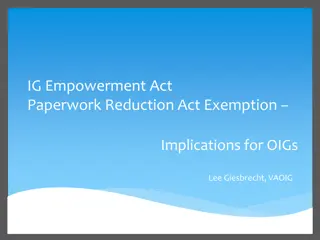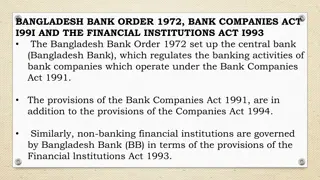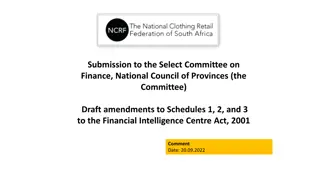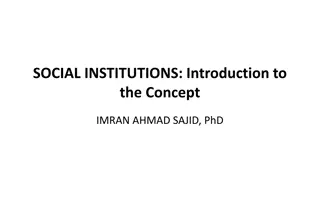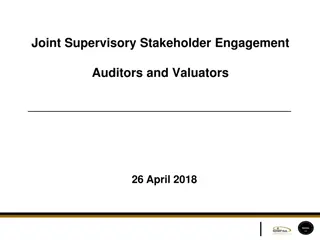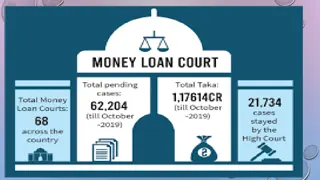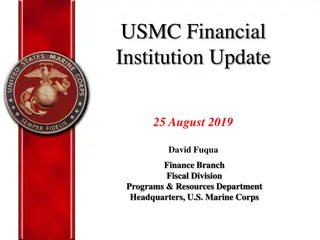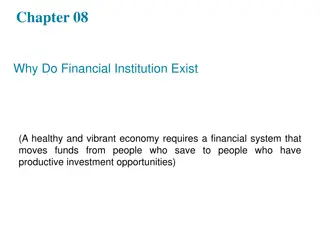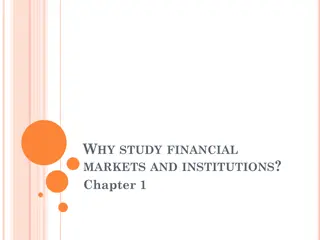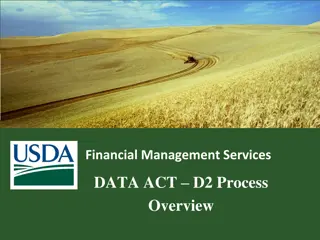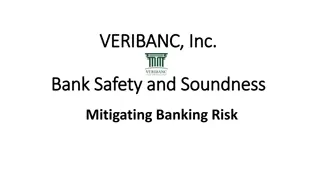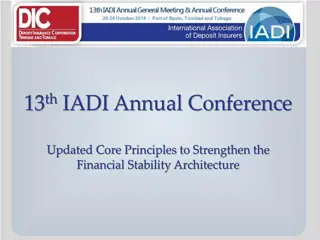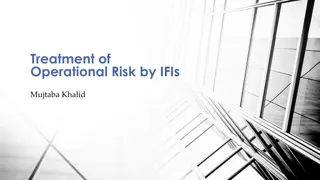FINANCIAL INTERMEDIARIES/FINANCIAL INSTITUTIONS
Discover the different types of financial intermediaries, including the unorganized and organized sectors. Learn about the institutions that facilitate financial transactions for individuals and corporations, such as local money lenders, commercial banks, and government agencies.
3 views • 6 slides
Role of Central Banks in International Financial Institutions
Central banks play a crucial role in the interconnectivity with international financial institutions like the Asian Development Bank (ADB) and the International Monetary Fund (IMF). These institutions aim to promote economic and social development, ensure exchange rate stability, provide financial a
1 views • 18 slides
National Financial Education Strategies and Best Practices
Financial education plays a crucial role in empowering individuals and ensuring financial system stability globally. The National Strategies for Financial Education (NFES) endorsed by the G20 have been adopted by approximately 100 countries. Different approaches such as stand-alone strategies, multi
5 views • 34 slides
How to achieve financial freedom in 5 years
Welcome to the Financial Freedom Challenge!\nAre you ready to take control of your financial future and unlock the door to lasting prosperity? Join us on a journey toward financial freedom like no other.\nWhat is the Financial Freedom Challenge?\nThe Financial Freedom Challenge is a transformative p
0 views • 9 slides
Overview of AANAPISI Program in the United States
The Asian American and Native American Pacific Islander Serving Institutions (AANAPISI) Program aims to support institutions with a minimum of 10% Asian American and Native American Pacific Islander undergraduate enrollment. Currently, there are 54 funded AANAPISI institutions across 16 states and t
0 views • 13 slides
Understanding Financial Leverage and Its Implications
Financial leverage refers to a firm's ability to use fixed financial costs to amplify the impact of changes in earnings before interest and tax on its earnings per share. It involves concepts like EBIT, EBT, preference dividends, and tax rates, and can be measured through the degree of financial lev
1 views • 7 slides
Financial Empowerment through the Allstate Foundation Curriculum
Explore the Allstate Foundation's Moving Ahead Curriculum on financial empowerment, focusing on Module 4 that covers building financial foundations, loan options, and organizing financial paperwork. Understand the importance of loans, documentation, and financial records for establishing a strong fi
0 views • 25 slides
Understanding Financial Economics and Its Importance in Markets
Financial economics is a branch of economics focused on the distribution of resources in uncertain markets. It involves making decisions considering future events and creating models to analyze variables affecting decisions. Key aspects include working out portfolio risks and utilizing financial ins
0 views • 129 slides
A Primer on Financial Ratio Analysis and CAHMPAS
This resource by the CAHMPAS Financial Team at University of North Carolina provides an in-depth look into financial ratio analysis, including the theory, types of analyses, and the importance of understanding financial indicators. It discusses how businesses can assess their financial performance a
0 views • 87 slides
Understanding Implications of IG Empowerment Act and Paperwork Reduction Act
The IG Empowerment Act provides beneficial provisions for Inspector Generals (IGs) such as exemptions from certain acts, including the Computer Matching Act and Paperwork Reduction Act. The Paperwork Reduction Act requires federal agencies, including IGs, to obtain OMB clearance before conducting su
1 views • 25 slides
Banking Regulations in Bangladesh: A Comprehensive Overview
The Bangladesh Bank Order of 1972 established the central bank, Bangladesh Bank, which regulates banking activities under the Bank Companies Act of 1991. This legislation, along with the Financial Institutions Act of 1993, sets the framework for overseeing bank companies and non-banking financial in
2 views • 27 slides
Proposed Amendments to Financial Intelligence Centre Act, 2001: Addressing Credit Providers Inclusion
Proposed amendments to Schedules 1, 2, and 3 of the Financial Intelligence Centre Act, 2001, specifically focusing on the contentious inclusion of credit providers as defined in the National Credit Act, 2005, as accountable institutions. The background, concerns raised by stakeholders, and a propose
0 views • 10 slides
Understanding Social Institutions: An Introduction by Imran Ahmad Sajid, PhD
Discover the concept of social institutions through Dr. Imran Ahmad Sajid's explanation. Explore how institutions are established practices that shape complex social forms, distinguishing between institutions and conventions, and their relation to society and culture. Delve into the role of institut
0 views • 14 slides
Role of Institutions in Economic Development: A Comprehensive Analysis
Understanding the significance of institutions in economic development is crucial, as they play a pivotal role in shaping societal, political, and economic relations. Institutions, defined as established customs or practices, act as the rules of the game that structure human interactions. Their qual
0 views • 13 slides
Albanian National Financial Education Strategy 2022-2027
The Albanian National Financial Education Strategy (NFES) aims to promote financial education for individuals, households, and MSMEs to enhance financial well-being and economic stability. It focuses on key interventions, foundational enablers, institutional coordination, funding, and monitoring. Fi
0 views • 19 slides
NAMFISA Organisational Restructuring and Regulatory Overview
NAMFISA, established under the NAMFISA Act of 2001, exercises supervision over financial institutions and services in Namibia. The organization recently underwent an organizational restructuring to optimize resources and enhance efficiency. They oversee a broad regulatory scope covering various fina
0 views • 25 slides
Artha Rin Ain 2003: Special Legislation for Financial Institutions' Debt Recovery
Artha Rin Ain 2003 is a special legislation aimed at enhancing the recovery process of outstanding debts of financial institutions in Bangladesh. The law addresses the shortcomings of previous acts and establishes dedicated courts for the swift resolution of cases involving unpaid claims. It encompa
0 views • 15 slides
Understanding Financial Statements Analysis in Business Finance
Understanding the analysis of financial statements is crucial for assessing the financial performance and position of an organization. This course provides knowledge, competencies, and skills necessary to apply basic financial statement analysis techniques, interpret financial numbers, and generate
0 views • 18 slides
Financial Services Institutions Support Value Chain Actors
Financial services institutions play a vital role in supporting various actors within the value chain, including exporters, wholesalers, banks, processors, and non-bank financial institutions. This ecosystem also involves technical training, business support, local traders, private investors, specia
0 views • 30 slides
Overview of Merchant Banking in India
Merchant banking in India traces back to the early 1960s, with Grindlays Bank pioneering the services in 1967. Over the years, foreign and Indian banks, as well as financial institutions, have ventured into this sector, offering services like managing share issues and providing financial consultanci
0 views • 8 slides
USMC Financial Institution Update - August 2019 Summary
The US Marine Corps provided an update on their financial institutions featuring key areas like program management, current issues, and a summary of institutions across different locations. Details include management personnel, the number of installations, types of financial institutions, and recent
1 views • 10 slides
Understanding the Jeanne Clery Act and Higher Education Opportunity Act
The Jeanne Clery Act, renamed in 1998, mandates public and private postsecondary institutions to comply with campus security and crime reporting regulations. It requires policy disclosures, record collection, retention, and information dissemination. Additionally, the Higher Education Opportunity Ac
1 views • 32 slides
Overview of Transfer with Success Act and Regulatory Changes in Maryland
The Transfer with Success Act, passed in 2021, introduced new requirements for public institutions in Maryland related to credit transfers between institutions. Recent stakeholder work groups and regulatory changes have paved the way for implementing these new regulations, aiming to facilitate smoot
0 views • 23 slides
Analyzing Systemic Climate Risk in the Financial Sector
This study discusses systemic climate risk in the financial sector by examining the effects of climate risks on financial institutions. It aims to design a market-based framework to assess the vulnerability of financial institutions to climate risks and analyze potential contagion effects. The frame
0 views • 39 slides
Understanding the Role of Financial Institutions in the Global Economy
Explore the significance of financial institutions in facilitating the flow of funds from savers to productive investments, essential for a healthy economy. Delve into topics like transaction costs, asymmetric information, adverse selection, and moral hazard in the financial system, along with basic
0 views • 19 slides
Understanding SOX Compliance and IT Controls in Financial Institutions
This article delves into the importance of Sarbanes-Oxley (SOX) Act compliance, especially in the realm of IT controls within financial institutions. Covering the history of SOX, financial implications, different provisions, and the significance of IT SOX 404 compliance, it also highlights sample te
0 views • 16 slides
Understanding Social Institutions and Welfare in Human Society
Social institutions play a crucial role in addressing social problems and meeting the basic needs of human societies. Concepts of welfare and institutions like family, education, economy, and politics are explored. Welfare is described as traveling smoothly on the road of life, derived from the root
0 views • 21 slides
Understanding Banking Institutions and Their Types
Banking institutions play a vital role in the financial sector by mobilizing public savings and providing funds to meet various financial needs. Commercial banks, investment banks, co-operative banks, and central banks are some examples of banking institutions. Scheduled banks enjoy certain benefits
0 views • 17 slides
Financial Literacy Empowerment in Eastern and Southern Africa
Developing countries in Eastern and Southern Africa are prioritizing financial education to empower consumers in making sound financial decisions. Financial literacy enhances financial inclusion, stability, and economic growth. It involves awareness, knowledge, skills, attitudes, and behaviors essen
0 views • 23 slides
Understanding the Significance of Financial Markets and Institutions
Studying financial markets and institutions is crucial as it facilitates the efficient transfer of funds, promotes economic growth, impacts personal wealth, influences business decisions, and plays a significant role in determining interest rates. Debt markets, including bond markets, enable borrowi
0 views • 15 slides
Understanding Why Financial Institutions Exist
Financial institutions exist to provide crucial services like intermediation, risk management, and facilitating economic activities by connecting savers and borrowers. The global financial structure involves various institutions like banks, insurance companies, and securities markets. Key facts incl
0 views • 45 slides
Financial Literacy and Education Commission: Coordinating Federal Efforts
Financial capability empowers individuals to manage financial resources effectively, make informed choices, avoid pitfalls, and improve their financial well-being. The Financial Literacy and Education Commission (FLEC) works to improve the financial literacy of individuals in the United States throu
0 views • 16 slides
Data Act Reporting and Financial Management Overview
The Digital Accountability and Transparency Act (DATA Act) of 2014 aims to enhance transparency in federal expenditures. It directs the government to standardize and publish various financial reports and data compilations related to obligations, spending, payments, budget actions, procurement, and a
0 views • 16 slides
Understanding VERIBANC Rating System for Financial Institutions
The VERIBANC rating system provides a simple two-part color code and star classification to assess financial institutions' current standing and future outlook. It considers factors like capital strength, asset quality, management ability, earnings sufficiency, liquidity, and market risk sensitivity.
0 views • 19 slides
Campus Sexual Violence Elimination Act (SAVE) at California Lutheran University
Campus Sexual Violence Elimination Act (SAVE) was passed in March 2013 as part of the Violence Against Women Reauthorization Act, impacting institutions of higher education like California Lutheran University (CLU). The act mandates CLU to educate its community on prevention/awareness of sexual viol
0 views • 22 slides
Key Aspects of Crisis Management and Preparedness in Financial Institutions
This presentation delves into the critical components necessary for reducing the Too Big to Fail problem in financial institutions. It emphasizes the importance of comprehensive recovery and resolution planning to prevent government bailouts and mitigate losses effectively. The Key Attributes of Eff
1 views • 18 slides
NORDRESS Project Governance and Administration Overview
The NORDRESS project involves various entities like the Executive Board, Council, Partner Institutions, and Supporting Institutions for day-to-day management, decision-making, and overall support. The Project Manager from the University of Iceland plays a central role, coordinating activities and li
0 views • 13 slides
Understanding Political Institutions and Their Significance in Governance
Dr. R.E.V. Gyampo, a lecturer in the Department of Political Science at UG College of Education, explains the concept of institutions, distinguishing between formal and informal ones. He emphasizes the importance of rules within institutions for predictability and behavior governance. The discussion
0 views • 14 slides
The Civil Rights Act of 1964 and the Supreme Court
In the 1960s, Congress passed the Civil Rights Act of 1964, a pivotal legislation that prohibited discrimination in public accommodations. This act represented a significant shift in focus towards minority rights. The Supreme Court's past rulings on the Civil Rights Act of 1875 influenced Congress t
0 views • 24 slides
Understanding Risk Management in Islamic Finance Institutions
Islamic Financial Institutions (IFIs) face various types of risks, including Shariah compliance, rate of return, displaced commercial equity investment, and operational risks. This content delves into how IFIs manage these risks through Shariah auditing, risk management for financial contracts, and
0 views • 35 slides









